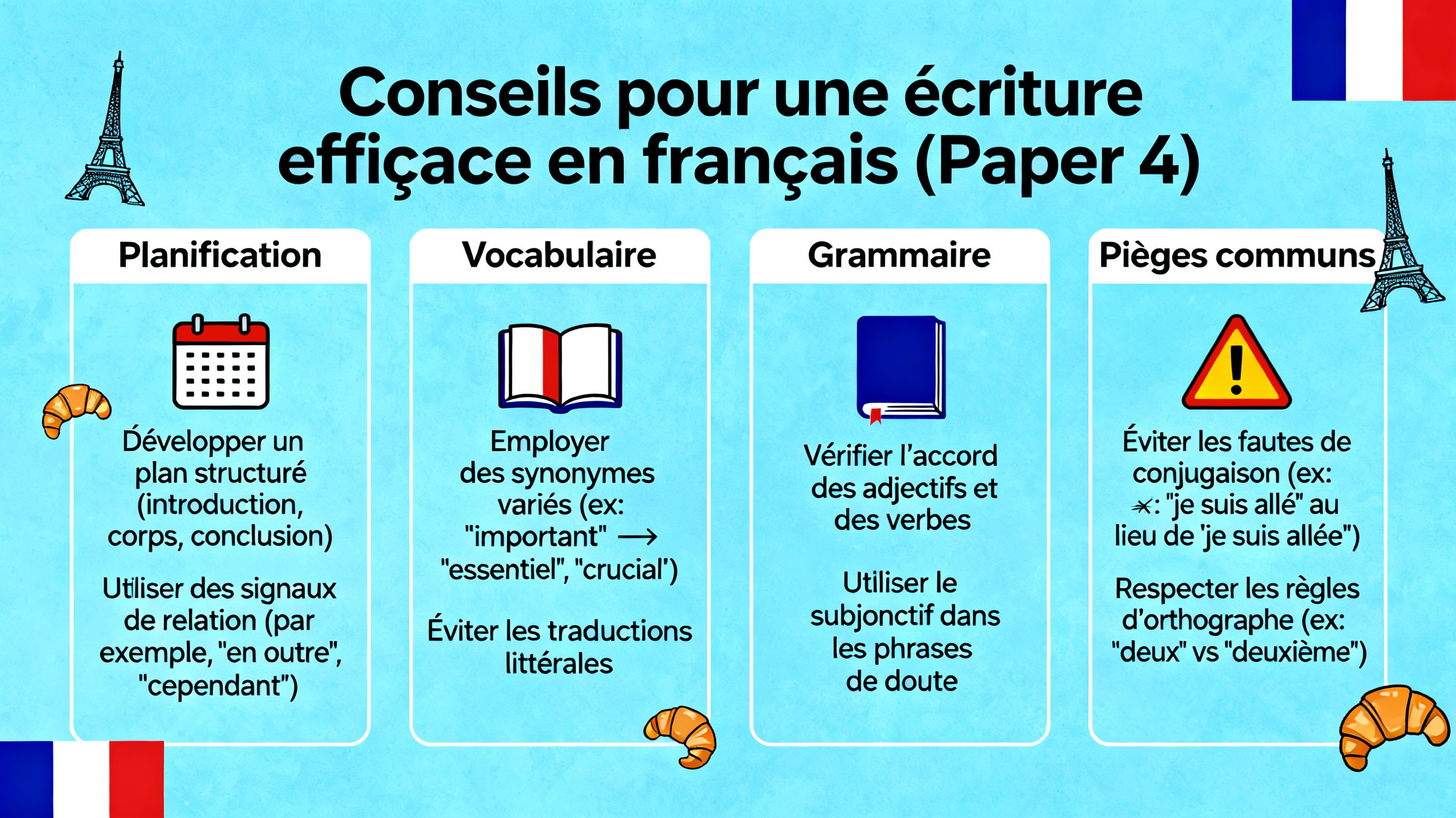planning, language accuracy, task structure, and showcasing a wide range of vocabulary and grammar. Here is a practical guide for excelling in this exam section, designed for your website and tailored to French learners preparing for high-stakes assessments.
Understanding Paper 4 Requirements.
French Paper 4 evaluates students' ability to communicate clearly, organize ideas, and apply correct grammar and vocabulary in a variety of written formats such as letters, articles, blogs, and formal or informal emails. Tasks can range from simple form-filling to extended one text of 80-90 and second text of 130–140 words, requiring students to express opinions, present facts, describe experiences, and use different time frames (present, past, and future).
 Key Strategies for Effective Writing
Key Strategies for Effective Writing
- Plan your response by identifying what each question requires before you start writing. Use a simple outline to organize your main points and supporting ideas.
- Pay close attention to the text type: adjust your register (formal/informal), use appropriate greetings and closings, and structure each section with paragraphs for clarity.
- Check the required tenses for each bullet point and answer with the correct forms. For instance, if a point asks about the past, use le passé composé or l’imparfait.
- Use a range of connectors like ensuite, cependant, and par conséquent to create logical links between ideas and paragraphs.
Vocabulary and Grammar Tips- Enrich your writing with thematic vocabulary sets related to common exam topics: family, school, hobbies, travel, and health.
- Practice using synonyms and antonyms to avoid repetition and demonstrate a broader lexicon.
- Showcase different grammatical constructions, such as relative pronouns (qui, que, object pronouns (le,la, les), and varied sentence starters for style and complexity.
- Integrate opinion phrases (à mon avis, je pense que), justifications (parce que, car), and sequence words for coherence.
Practice, Review, and Revision- Practice by writing regular journal entries, letters, and short essays on exam-related themes.
- Analyze high-scoring sample answers to identify efficient language use and organization.
- Simulate exam conditions with past papers to improve time management and build confidence before the actual test.
- Review your work thoroughly for grammar, spelling, and agreement errors. Checking your writing multiple times can catch mistakes easily missed in a first read.
Common Pitfalls and How to Avoid Them- Avoid narrative drift: Stick closely to all bullet points and respond directly, organizing each paragraph around a specific point.
- Don’t overcomplicate—prioritize clarity over complexity, especially if unsure of advanced structures.
- Balance showcase of skill with accuracy: It's better to write slightly simpler sentences correctly than to attempt complicated structures with frequent errors.
Final Checklist Before Submitting- Have you responded to each bullet point with appropriate detail and structure?
- Is your text divided into paragraphs with logical connectors?
- Have you used a range of vocabulary and tenses, matching the requirements of each question?
- Is your register and tone suitable for the text type?
- Did you check for grammar and spelling mistakes at least twice?
Mastering these steps, paired with consistent practice and self-review, will significantly strengthen your performance in French Paper 4, helping you achieve the scores you aim for.
 Key Strategies for Effective Writing
Key Strategies for Effective Writing